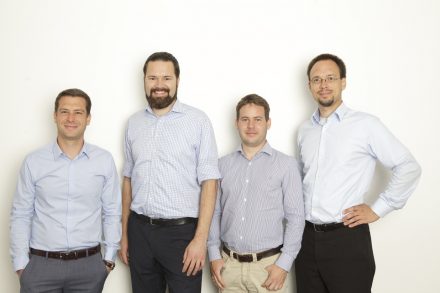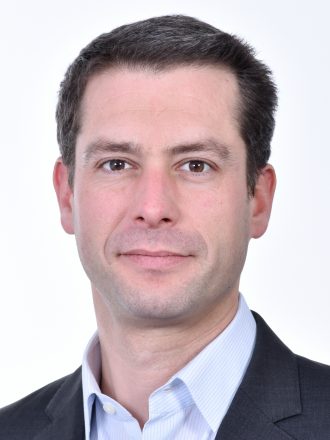The Munich startup CQSE helps companies future proof their software for the continued digitalization of the economy. The four founders discovered the trend in 2009. With an increasing number of large and small companies noticing that their software is no longer up-to-date, they have benefitted from the expertise provided by the expanding young company. How are things going at CQSE? And what management tips might the CEO have for other rapidly growing startups?
As soon as companies modify their software and integrate new functions, there is a risk that future versions of the software will not function like their predecessors. That poses a variety of challenges to companies.
Understanding and future proofing software as opposed to results ranging from annoying to disastrous
An annoying example would be a case in which an insurance company has updated its software — and suddenly the payments are no longer calculated properly. Or a case in which a car manufacturer would like to modify its brake control systems — the worst result being that the car’s brakes no longer work. Examples can be found across all industries, because software plays a decisive role nearly everywhere and can be compared to a machine that requires regular maintenance.

In order to understand their software and maintain it themselves, many companies proactively contact CQSE. Their name says it all. CQSE means “continuous quality in software engineering,” and that is exactly what the Munich-based team offers with its analytical tools and expert examination. Dr. Martin Felkas, Dr. Elmar Jürgens, Dr. Benjamin Hummel and Dr. Florian Deißenböck founded the company together in 2011.
Shrewd examination by experts
We spoke with managing partner Dr. Deißenböck to ask how his company works. There are two important factors: when evaluating a software system to find out how future proof it is, analytical tools are used, i.e. “algorithms.” The second factor is manual examination, or as he calls it — shrewd examination by experts. He explained:
“The combination is important, because algorithms on their own cannot fully answer customers’ questions. One aspect that plays an important role in how future proof a software system is: how well is it documented? In other words, how well would another person be able to understand what the system is doing? That is something an algorithm cannot determine. I need a person to perform that step. We do not, however, touch our customers’ software systems. We do not repair defects ourselves, but instead make concrete — and continuous — suggestions for improvement.”
After all, objectivity is important during an assessment, and during shrewd examination as well. It is worth noting that the number of doctor titles on the CQSE team webpage is rivaled only in the realm of healthcare. That is certainly no coincidence, considering that the company was founded by doctoral candidates as a spin-off from the Technical University of Munich from Professor Broy’s informatics department.
A remarkable recruiting process
But it doesn’t end there. Dr. Deißenböck explained:
“We’ve organized the recruiting process to allow us to not only ‘skim off’ individuals coming directly from the master’s program, but also exceptional experts in the industry who have completed their doctorates in the field. The aim in the company is to accumulate in-depth expertise for the analysis of these types of issues. In fact — and this is something I am very proud of — we have a pooled concentration of competence that is also recognized as such. That is not only true among our customers, but also in the academic sphere.”

It is this exceptional expertise that is one of the company’s unique selling points — or how does the founder gauge the competition?
“We are indeed the only company in Germany with such a sharp focus on future proofing software systems. That of course does not mean that major management consultants do not also offer the same thing. But there is no other company in Germany that explicitly focuses on this aspect.”
The company currently employs a team of 30 and looks like it will continue to grow. CQSE was able to demonstrate 30% to 40% growth over recent years. This made the gate startup center the ideal location for the startup where companies can grow from 130 to roughly 1300 square feet. The forecasts continue to look outstanding, which is why the startup began looking for a new home base. In late 2018, the company plans to move into its own office building in Freiham in the west of Munich.
Bootstrap financing
The startup has financed itself so far. Apart from two funded research projects, there has not been any external money. Since CQSE began exclusively as a consulting business, it was relatively easy for the founders to bootstrap. The research projects funded by the Federal Ministry of Education and Research (Bundesministerium für Bildung und Forschung – BMBF) provided independence. The projects, which served to ‘create tools,’ i.e. developing methods and algorithms for improved software quality, also made it possible to build a solid foundation. Dr. Deißenböck said:
“We have not experienced exponential growth, but have instead grown more organically. Of course, we could have tackled much different areas with outside finances. But we made a conscious decision against that. We always wanted to be our own bosses and also want it to stay that way.”
The most challenging current issue mentioned by the company founder has been finding the right balance between the workload and the number of employees available and the recruiting of good employees. And that is despite CQSE having two successful personnel “pipelines”: one being the early integration of TU students, including thesis supervision. The other is an excellent network of doctoral candidates in the academic world.
Tips for rapidly growing companies
We wanted to find out: is there one mistake that has taught the founders an incredible amount?
“Hm.”
Contemplative silence.
“It’s not a good sign if you can’t quickly recall your mistakes.”
But then he did share a bit of insider information:
“A very important topic for us is the equal treatment of all employees. In retrospect, salary negotiations became quite tough for me at a certain point. As a result, we introduced an extremely transparent remuneration system a while back that all employees can understand. That eliminates having to discuss it with every single applicant or current employee. That being said, introducing the new model was a lengthy process because we needed to accommodate all of the existing contracts.”
Which is why the CEO recommends that other rapidly growing companies tackle the issue of structuring their remuneration model early on. Then everyone feels good about it without needing to spend too much time in one-on-one discussions. And that frees up more time for working on the company’s core business.
Happy or not? – “An absolute recipe for success”
Another important aspect for CSQE is receiving open feedback from their employees. Quarterly employee appraisal interviews have proven to serve the purpose well. Although it was implemented more by accident in the beginning, the founders wouldn’t do it any other way now.
“Once every quarter, we request that our employees ask themselves whether they are happy or not, and that they also soundly explain the areas that make them unhappy. I would call it an absolute recipe for success.”
“Don’t drive yourself crazy”
When asked about the best tips for other founders, Dr. Deißenböck answered:
“I would primarily advise them to not drive themselves crazy with all the fuss about startups, and all the advisory services that are offered, and all the things you are supposed to do. Instead, concentrate on asking yourself what you can really do and whether you can find customers for it. If you are able to answer that with a “yes,” then you can count on a serene future.”
